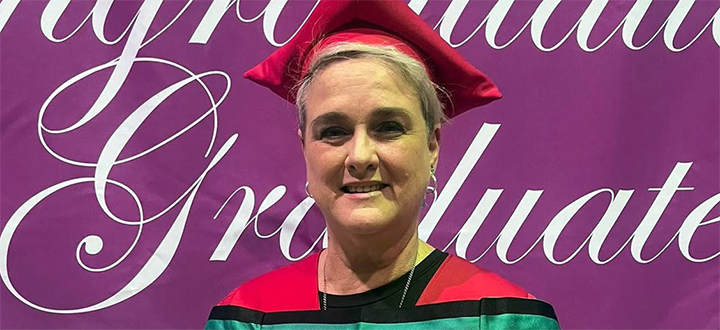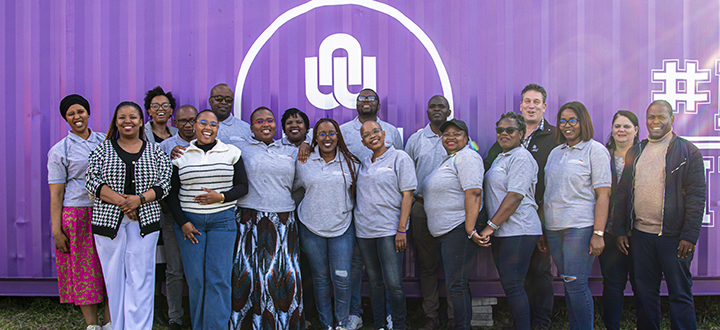College of Agriculture & Environmental Sciences
Celebrating World Health Day
World Health Day is celebrated annually on 7 April. Each year, the event draws attention to a specific health topic of concern to people all over the world. The date of 7 April marks the anniversary of the founding of the World Health Organization (WHO) in 1948. In the midst of challenges such as a pandemic, a polluted planet and increasing diseases like cancer, asthma and heart disease, World Health Day 2022 focused on urgent actions needed to keep humans and the planet healthy and to foster a movement to create societies focused on well-being. The theme for World Health Day was “Our planet, our health”.

Prof Ntwasa, the Acting Executive Dean of the College of Agriculture and Environmental Sciences and a Biochemistry professor in the Department of Life and Consumer Sciences
Prof Ntwasa, the Acting Executive Dean of the College of Agriculture and Environmental Sciences and a Biochemistry professor in the Department of Life and Consumer Sciences, made a presentation during the celebration of World Health Day via MS Teams. Prof Ntwasa is currently conducting research on anticancer drug discovery and development along with his team members at the University of South Africa. He is a well-published researcher with several patents under his belt.
The subtitle of Prof Ntwasa’s presentation for the day was “Is diet important for the management of cancer?”. Cancer cells consume 12 times more sugar than normal cells, he noted. Otto Warburg observed this phenomenon for the first time in 1924. However, scientists failed to recognise it as a major factor in the development of cancer for more than 50 years.
In recent years, scientists acquired renewed interest in sugar, realising that it is an important factor in understanding the development of cancer. Furthermore, it appears that there are opportunities for exploiting it in developing anticancer treatments.
Prof Ntwasa investigated strategies for the protection of normal cells undergoing chemotherapy since this treatment cannot discriminate well between cancer cells and normal cells. Hence, chemotherapy is a harsh treatment, causing patients to suffer from many side-effects, such as damage to the reproductive system, loss of hair and damage to the digestive system (e.g., diarrhoea).
“For convenience, we used the fruit fly as a model for our studies since it has comparable genetics to humans. We found that normal cells draw on glucose metabolism when they recover from chemotherapy. This prompted us to test possible interventions by disturbing glucose metabolism in human cancer cells. We found that when we sabotage the unusual glucose usage phenomenon in cancer cells, we are able to kill them and preserve normal cells.”
Key observations
- Methyl pyruvate protects an irinotecan-treated normal lung fibroblast cell line (MRC-5), probably by turning off the p53/p21 axis of the apoptotic pathways.
- When the MRC-5 fibroblasts recover in a drug-free medium, the intrinsic apoptotic pathway is also turned off.
- In contrast, the mere introduction of exogenous pyruvate kills the cancerous lung fibroblasts (A549).
- When combined with irinotecan, cell death occurs in cancer cells but not in the normal cell line.
Food for thought
- Sugar feeds cancer.
- A carbohydrate-rich diet should no longer be overlooked during the management of cancer.
- Problem: carbohydrates are required by all cells.
- Bypassing glycolysis and boosting respiration may be a good strategy for protecting normal cells during chemotherapy and in the management of cancer in general.
Ms Mthuli also delivered a presentation at the event. She spent close to 30 years working as a dietitian and nutritionist in the pharmaceutical and food industry. Ms Mthuli’s purpose is to be a catalyst for growth by harnessing the individual power of a collective group of people for the common good. She believes that private/public partnerships are key to unlocking value for people and the planet. Ms Mthuli, speaking on the subtopic “Eat for good”, pointed out two troublesome truths about food that we cannot avoid.

Ms Mthuli and Ms Malefo
Double burden of malnutrition
A total of 5,6% (38,3 million) of the world’s children were overweight and 6,9% (47 million) were affected by wasting in 2019. Adult obesity continues to rise – if the current trend continues, adult obesity worldwide will reach 40% by 2025. The Covid-19 pandemic could add a further 100 million to the 1,25 billion people who face food insecurity and the 7,2 billion who suffer from micronutrient deficiency.
Ms Malefo, a health and wellness manager at the University of South Africa, delivered a presentation on the mandate of the Higher Education and Training Health, Wellness and Development Centre. She is a counselling psychologist (HPCSA-registered independent practitioner) and a former chairperson of the South African Association of Counselling Psychology, a division of the Psychological Society of South Africa (PsySSA). She has extensive experience in counselling and psychotherapy with an inclination towards psychodynamic psychotherapy and cognitive behavioural therapy.
Ms Malefo indicated that she was delighted to be sharing information with colleagues with a view to reaching other health services within the institution. “I couldn’t resist the theme for this year’s World Health Day because it speaks volumes,” she said.
Mandate : Higher Education and Training Health, Wellness and Development Centre, formerly Higher Education HIV/AIDS Programme (HEAIDS)
Promote health and wellness through, among other things,
- health education/promotion
- medical screening (HIV, Covid-19, chronic illnesses)
- referral to the next level of care
- advice to executive management
- policy development and SOPs
- regional support
Key results/performance areas
- Policy development
- Funding norms and standards
- Teaching and learning (teacher education)
- Prevention, treatment, care and support
- Research and knowledge generation
- Human resource capacity and system development
High-level processes Primary health-care services
Provide comprehensive primary health-care (PHC) services and interventions in keeping with sectoral and professional protocols to mitigate the impact of employee absenteeism (on account of ill health) on the institution.
Continuous professional development
Promote opportunities for continuous professional development for purposes of compliance with professional protocols and mandatory upscaling of professional knowledge, skills and general development.
Health promotion through education, information and communication
- Provide comprehensive institutional HIV/AIDS policy development, implementation, monitoring and evaluation programmes in keeping with sectoral and professional protocols.
- Ensure effective management of HIV/AIDS in the work, teaching and learning areas.
Monitoring and evaluation of PHC and HIV/AIDS interventions
Ensure monitoring and evaluation of PHC and HIV/AIDS programmes to fast-track institutional compliance pertaining to legislative, sectoral and professional frameworks for PHC services.
HIV/AIDS policy development and implementation
- Facilitate management consultation to engender a prolific and resilient workspace.
- Ensure health promotion through education, information sharing and communication.
- Provide insight into the institutional health profile with reference to chronic medical conditions, including HIV/AIDS, through regular reporting and consultation
- Advise management on compliance pertaining to the management of chronic illnesses, including HIV/AIDS, as well as the effective management of gender-based violence.
Ms Malefo noted that while the Covid-19 pandemic showed us the healing power of science, it also highlighted the inequities in our world. The pandemic has revealed weaknesses in all areas of society and underlined the urgency of creating sustainable well-being societies committed to achieving equitable health now and for future generations without breaching ecological limits.
The present design of the South African economy leads to the inequitable distribution of income, wealth and power, with too many people still living in poverty and instability. A well-being economy has human well-being, equity and ecological sustainability as its goals. These goals are translated into long-term investments, well-being budgets, social protection and legal and fiscal strategies. Breaking the cycles of destruction for the planet and human health requires legislative action, corporate reform and individuals to be supported and incentivised to make healthy choices.
Publish date: 2022-06-22 00:00:00.0


 Shedding light on the well-being of ODeL facilitators
Shedding light on the well-being of ODeL facilitators
 A giant leap for student success and retention
A giant leap for student success and retention
 SWEEP: Where women entrepreneurs take the lead
SWEEP: Where women entrepreneurs take the lead
 A sense of belonging and excellence nurtured through collaboration
A sense of belonging and excellence nurtured through collaboration
 Wielding her Unisa PhD, Botswana educator champions early childhood development
Wielding her Unisa PhD, Botswana educator champions early childhood development